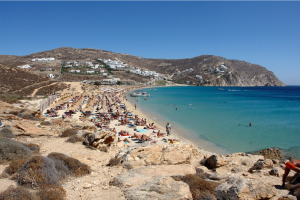Opinion: FIFA Should Have Picked a Different Country to Host the World Cup
December 19, 2022
Throughout the duration of the World Cup, which Argentina won on December 18, Qatar has come under immense criticism for their handling of the tournament. Preparations for the Cup began in 2010, and since then, over 6,000 workers have died, according to an investigation done by The Guardian. And among the human rights violations comes other problems, such as pollution due to the building of infrastructure in Qatar.
So how did Qatar even get to hold the World Cup with all these problems? It’s clear it wasn’t a good fit for the tournament. The answer, simply put, is money.
The World Cup is awarded during a bidding process where countries can submit a proposal to FIFA. According to multiple sources, 2020 officials from Qatar had bribed FIFA members to support their bids to host the Cup.
“FIFA is so corrupt as it is…there’s so much money in Qatar. And money isn’t everything, as we know, but it’s a lot of things for a lot of people in a lot of countries,” Amanda Brightbill, a teacher at MT, said.
For a country as small as Qatar (about the size of Connecticut), it’s extremely difficult to hold an event as big as the World Cup. Over $200 billion were poured into construction of a whole new city to hold the tournament, including a subway system, airport, hotels, and residential buildings.
“I don’t think Qatar should have been allowed to host the World Cup because they knew they didn’t have the stadium, they knew they would have to make them, and they knew the consequences that would have on the environment,” said junior Ariel Blumenthal.
Along with the environmental impact of the construction, over a million fans have traveled to Qatar to watch the tournament. This means an enormous amount of greenhouse gasses as a byproduct of air travel have also been a result of the Cup.
But compared to the human rights violations coming out of this World Cup, the pollution is the least of Qatar’s problems. 30,000 migrant workers were needed just for the construction of the stadium, and once arriving in Qatar, these immigrants were exposed to conditions too horrible to imagine.
Workers were lured to Qatar with promises of large salaries and a better life. But upon arrival, many migrants would have their passports taken from them until they submitted their signed contracts, virtually locking them into years of labor, said PBS. These workers were fed rotten food and given little water even while toiling in 125 degree heat. With these conditions in mind, it’s no wonder 6,750 workers died during construction.
“It’s not fair. It shouldn’t have to be that way,” said sophomore Ashley Bryant. “People shouldn’t have to die just so that the World Cup can happen.”
But the criticism against Qatar doesn’t end there. The country has faced other human rights allegations throughout the duration of the World Cup. Women’s rights are severely limited in Qatar and homosexuality is illegal, something that has many human rights activists angry.
Qatar has even attempted to control the players. The teams from England, Germany, and France were all planning on wearing armbands to protest the LGBTQ+ restrictions in Qatar, but were advised against it when told they’d get a yellow card for their actions.
It’s human rights violations such as these that have so many people angry. “I don’t understand. It’s human rights. It’s 2022. Grow up,” Blumenthal said.













